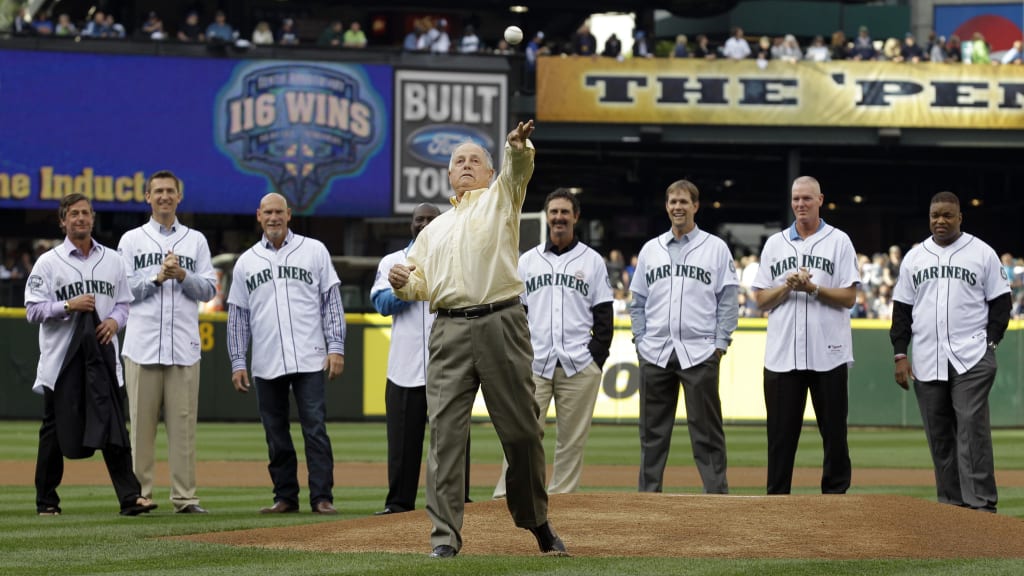
SEATTLE -- When identifying the best general manager in Mariners’ history, one number makes things pretty simple.
116.
That’s the win total of the 2001 Mariners, a club pieced together by Pat Gillick after the new GM had been forced to trade Ken Griffey Jr. and lost Alex Rodriguez in free agency shortly after taking over in 2000.
Gillick turned out to have the magic touch with the Mariners, using the money freed up by those departing superstars to form a club that tied the Major League record for most victories in a season and ran away with the American League West title.
Gillick only spent four seasons in Seattle, but all four of his teams posted winning records, and Seattle reached the AL Championship Series in both 2000 and ’01.
That run of success was no fluke, as Gillick did well everywhere he went, winning two World Series titles in Toronto in 1992 and ‘93 and another in Philadelphia in 2008. In 27 seasons as a GM, Gillick’s clubs have boasted winning records 20 times and earned 11 playoff berths. He was inducted into the National Baseball Hall of Fame in 2011.
“Baseball is about talent, hard work and strategy,” Gillick said in his Hall of Fame induction speech. “But at the deepest level, it’s about love, integrity and respect.
“That’s just how we all operated back then. We fought like heck for every player and every advantage, but we knew we were part of something bigger than ourselves. To me, that’s what baseball is all about. I hope it’s what baseball is always about.”
Gillick had already won the two World Series with the Blue Jays and put together a good three-year run with the Orioles when he was hired by Seattle to replace the retiring Woody Woodward in 2000, but he inherited an immediate challenge when Griffey requested to be traded as he headed into his final contract year.
With 10/5 rights -- having played 10 years in MLB and at least the last five with the same team -- Griffey controlled where he could be dealt and Gillick’s only option wound up being the Reds. So four months after his arrival in Seattle, the new GM traded the most popular player in franchise history.
Of the four players he received in return, only center fielder Mike Cameron wound up being a significant contributor. But Cameron capably filled Griffey’s center field role and Gillick began using the available payroll -- bolstered further by increased attendance and the opening of Safeco Field in 1999 -- to put together a roster that went 91-71 in 2000, the best record in franchise history at the time.
That trend continued after Rodriguez signed with Texas for 10 years and $252 million the following offseason despite the Mariners’ attempts to re-sign the budding superstar.
"We certainly wanted to bring Alex back," Gillick told MLB.com in 2017. "We made him an offer, as I recall something like $19 million a year for five years, so $95 million -- and we were prepared to go a little higher. But his rep indicated we weren't even in the ballpark. When he said, 'You're not even in the territory,' we knew he was probably going somewhere else.
"We couldn't allocate that much payroll to one player. We felt we needed to spread payroll over our entire roster, maybe 25 guys at $4-5 million, as opposed to one guy making a lot of money at that time."
Gillick struck gold on several smaller deals that came up huge, signing Ichiro Suzuki out of Japan as well as second baseman Bret Boone. Ichiro hit .350 with 56 stolen bases and won the AL Most Valuable Player and Rookie of the Year Awards that year, while Boone finished third in AL MVP voting after hitting .331 with 37 homers and 141 RBIs.
Almost all of Gillick’s free-agent moves paid off in those first two years, as he had already brought in first baseman John Olerud, closer Kazuhiro Sasaki, starter Aaron Sele, setup man Arthur Rhodes and veteran leaders Stan Javier and Mark McLemore in 2000. He then also added standout relievers Jeff Nelson and Norm Charlton in ’01.
"We had a pretty well-balanced club," Gillick said. "Good pitching, solid defense, great hitting and probably the best DH in the business in Edgar [Martinez]. And staying healthy was a big part of 2001. I thought it was going to be difficult with A-Rod gone, but when Ichiro started playing, I knew he'd pick up some of the offense we'd lost in Alex.
"And Boone was kind of down at the end in free agency, and we got him late at a pretty reasonable price. A lot of fortunate things happened for us."
Fortunate, indeed. But Gillick had a habit of making things work out, which is why his plaque now resides in Cooperstown.
